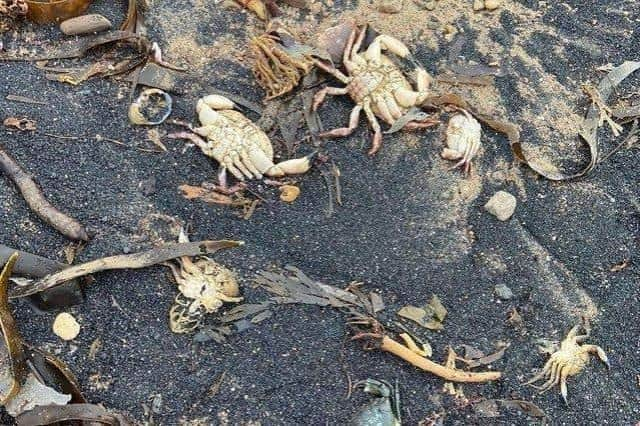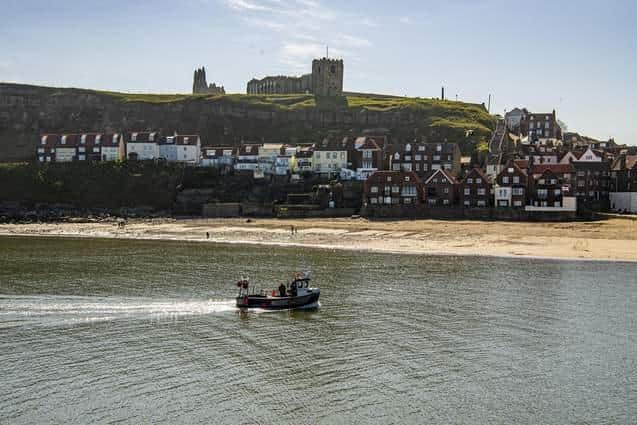Findings of Government investigation into crab and lobster deaths called into question again


They have been washing ashore in Yorkshire and the North East since October and an investigation, led by the Department for Environment, Food and Rural Affairs (Defra), found a naturally occuring algal bloom is “the most likely cause”.
Local fishermen, who claim their livelihoods are at risk because catches have been decimated, believe the deaths are linked to harmful chemicals disturbed by dredging in the River Tees, but the investigation ruled this out.
Advertisement
Hide AdAdvertisement
Hide AdHowever, marine pollution consultant Tim Deere-Jones, who was hired by local fishermen to analyse Defra’s investigation, has cast doubt over the findings.


He said claims that an algal bloom has caused the death are “unsubstantiated” and the Government department has “focused on avoiding serious investigation of toxic chemicals”.
It comes after Environment Minister Victoria Prentis defended the investigation in Parliament earlier this month, claiming it involved “extensive testing, research and analysis” which was conducted by several specialist Government departments.
She also said the Government is not planning to compensate fishermen affected by the lobster and crab deaths, because it was a naturally occurring event.
Advertisement
Hide AdAdvertisement
Hide AdDefra’s report on its own investigation stated a harmful algal bloom was “indicated by satellite imagery” and then confirmed when algal toxins – known as okadaic acid and dinophysistoxin two – were found in dead crabs and lobsters.
After analysing a briefing report on satellite images, from Plymouth Marine Laboratory, Defra stated a bloom of the harmful algal species Karenia Mikimotoi appeared to have been identified.
However, Mr Deere-Jones has pointed out that Plymouth Marine Laboratory’s briefing report also stated it “may well be” a dense bloom of another species which “resembles Karenia”.
He said Defra has “no definitive empirical evidence” to show it was any of the 12 recognised Karenia species and the satellite images “may have actually captured dredge plumes and not an algal bloom”.
Advertisement
Hide AdAdvertisement
Hide AdHe added: “Only very small numbers of harmful algae were found in water samples and these were far below the concentrations expected to occur in a developed bloom intense enough to kill so much marine life.”
Mr Deere-Jones also stated the chemical pyridine is “strongly suspected” to be the cause.
He said it has been produced as a by-product by industrial activity around the River Tees for more than 100 years and there is evidence to suggest sediment containing the chemical may have been disturbed by dredging.
Pyridine was found in some of the crabs, but Defra said the chemical, which can form naturally in crustaceans after death, did not kill them and “varying amounts” have been found in crabs in other parts of the UK.
Advertisement
Hide AdAdvertisement
Hide AdBut Mr Deere-Jones said Defra has failed to explain why levels of pyridine found in crabs in the North-East were around 80 times higher than those found in crabs in Cornwall.
He said Defra has failed to take note of the latest scientific research on the toxicity of pyridine and the Marine Management Organisation, which checks dredged material, does not routinely test for pyridine.
A Defra spokesman said: "Defra led comprehensive research into the cause of dead crabs and lobsters that washed up on the North East coast between October and December last year.
"Government scientists carried out extensive testing for chemicals and other pollutants, including pyridine, but the expert research concluded a naturally occurring algal bloom was the most likely cause. It’s a complex area of research – and we will continue to work with universities and other experts to understand it better.”
Comment Guidelines
National World encourages reader discussion on our stories. User feedback, insights and back-and-forth exchanges add a rich layer of context to reporting. Please review our Community Guidelines before commenting.
